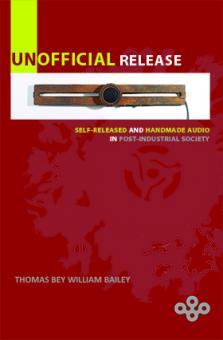 Unofficial Release: Self-Released And Handmade Audio In Post-Industrial Society
Unofficial Release: Self-Released And Handmade Audio In Post-Industrial Society
Thomas Bey William Bailey
Unofficial Release: Self-Released And Handmade Audio
In Post-Industrial Society
(Belsona Books Ltd., 2012)
Unofficial Release is a brimming book that captures the key cultural philosophies of self-released music and sound art, emphasizing activities within the cassette network—that was so exciting to partake in back in the 1980s (a k a cassette culture). As such, it has a historical focus, however a non-cumbersome one. I immediately recognized a timely relevance of this book in relation to the dissatisfied youth movements in America (Occupy Wall Street), Europe, and Northern Africa. The activists’ impatience with officially sanctioned channels of production and distribution dovetails nicely with the Do-It-Yourself ethos that this historical material supports; a perfect book for those who wish to get familiar with freely movable art made in the context of unbound and independent self-reliance.
But more than focusing on cassette culture alone, Unofficial Release also covers other wonderfully arcane areas of artistic production—and importantly, distribution—stemming from the networked “mail art” of the 1970s (rooted in Dada, Surrealism, and Fluxus), the home-tapers, and the current establishment of music labels dealing solely in digital sound files. One could easily group this book with other explorations of sonic audio art and weird music, such as Paul Hegarty’s Noise/Music, Caleb Kelly’s Cracked Media: The Sound of Malfunction, Brandon LaBelle’s Background Noise: Perspectives on Sound Art, Salome Voegelin’s Listening to Noise and Silence, Joanna Demers’s Listening Through The Noise, Steve Goodman’s Sonic Warfare, and my own Immersion Into Noise.
While Thomas Bey William Bailey (also the author of Micro Bionic: Radical Electronic Music And Sound Art In The 21st Century) kicks things off with his own personal development in the field of weirdly wonderful hacked electronics, sound art, and nonsense noise music (the least interesting part of the book) he then quickly turns to a wide range of fascinating theorists and artists for their key input, including ‘Gen’ Ken Montgomery, The Tapeworm, Alexei Monroe, Oren Ambarchi, and David Tibet. Also crucial to the book are many long-form interviews with artists such as Frans de Waard, Vittore Baroni, Rod Summers, GX Jupitter-Larsen.
At times I was nodding in accord, and in the next moment I was aggravated, shaking my head wondering how the book will all tie in together. But I like to have my prejudices exposed and challenged and it seems that this book did just that. My only quibble is that it would have been interesting to augment this book with audio files of some of the work discussed.
That said, Unofficial Release is a remarkable study into an area of noise music and sound art that (until now) has not been very well documented. Without doubt this book would be a valuable addition to the study (and enjoyment of) art music and networks. I greatly admired its research, bringing together somewhat obscure (and therefore highly interesting) acts of independent production and distribution. The chapter “Why We Tape: Cassette Culture As A Real Alternative” is particularly fecund. With the love of an aficionado, Thomas Bey William Bailey is happy to trumpet distinctive choices and to argue for their artistic, political and philosophical benefits. That is what makes this a commendable book.
Published at the Brooklyn Rail (November 2012 issue): Noise’s Nectar by Joseph Nechvatal http://www.brooklynrail.org/2012/11/books/noises-nectar
Noise’s Nectar
Noise’s Nectar by Joseph Nechvatal http://www.brooklynrail.org/2012/11/books/noises-nectar